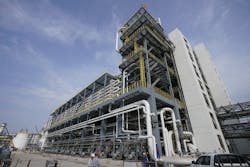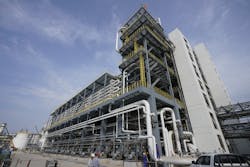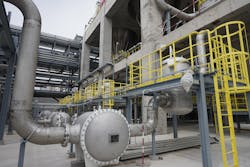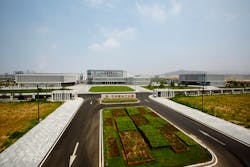China’s Wanhua Chemical Group transforms plant into finely tuned testimony to digitalization
The company’s operations are extensive. In addition to its world-class, highly competitive manufacturing technology for producing manmade chemicals, it boasts complete industry chain manufacturing technology of Nylon-12 and citral, as well as a complete C2/C3/C4 petrochemical industry chain. Wanhua Chemical Group currently has manufacturing bases in Yantai, Ningbo, Zhuhai, Meishan and Fujian, China, as well as locations in more than 10 countries and regions including Europe, Middle East, U.S., Japan and India. But it’s the digital transformation of its Wanhua Yantai Industrial Park that has earned it the honor of FieldComm Group's 2022 Plant of the Year.
“We have five sites in China and Yantai is the largest,” says Lee, Caihua, director of instrumentation for Wanhua Chemical’s Yantai Industrial Park, via a translator. “We also have a plant in Europe and other office locations all over the globe.”
The installation of FieldComm Group’s technologies has been the basis of the plant’s improved operations, maintenance and asset productivity in real-time applications. In addition, FieldComm Group’s technology has helped the company save tens of millions of dollars in operational costs ranging from reductions in configuration and commissioning times to remote maintenance capabilities.
Instrumentation with FieldComm Group’s technologies is prominent throughout the Yantai plant. “Wanhua Chemical’s Yantai Industrial Park features about 30 sets of production equipment with a production scale of nearly 500,000 I/O points,” says Lee. “Intelligent measuring instruments and valve positioners in the plant make full use of FieldComm Group’s FOUNDATION Fieldbus, HART and WirelessHART technology, which operate in up to 180,000 I/O points and account for 96% of the analog instruments and valves.”
Wanhua Chemical uses two Emerson AMS Asset Optimizers to cover the total number of points.
Among its four major industries, Wanhua Chemical has installed tens of thousands of FieldComm Group's FOUNDATION Fieldbus and HART instruments and valves in its facilities, according to Wanhua Chemical Group representatives. Among them are:
- Polyurethanes (5,000 FOUNDATION Fieldbus and 30,000 HART)
- Petrochemicals (4,000 FOUNDATION Fieldbus and 56,000 HART)
- Fine chemicals (70,000 HART)
- Emerging materials (15,000 HART)
In Yantai Industrial Park, Wanhua Chemical uses more than 50 sets of Emerson’s AMS Device Manager featuring FOUNDATION Fieldbus, HART and WirelessHART. AMS is used for startup and commissioning, online monitoring, predictive maintenance and valve diagnostics.
Adding value and savings to operations
Wanhua Chemical’s representatives state there have been numerous value-added benefits to using FieldComm Group’s technologies at Yantai Industrial Park. “Intelligent instruments with FOUNDATION Fieldbus and HART can provide valuable health information about themselves, which can be well integrated with control and asset management systems to save time during commissioning and throughout the plant’s life,” Lee says. “By using FOUNDATION Fieldbus and HART instruments and AMS, [we] reduced commissioning time, and provide more efficient and dependable operations.”
Among the value-added benefits, according to Wanhua Chemical:
- Intelligent instruments were configured with FieldComm Group technology, which eliminated the need to go into the field for configuration. The streamlined process saved 60% on time and reduced potential risks to workers in the field.
- Device commissioning was faster and easier, and saved 30% on commissioning time.
- Routine field maintenance was reduced because a “healthy status” can be indicated online;
- With FOUNDATION Fieldbus and HART predictive maintenance implemented, instrument failed alerts and shutdowns were reduced.
- Online valve diagnostics improved plant maintenance.
Configuration costs controlled
Thanks to the 60% reduction in configuration time, Lee says the plant saved an estimated $3 million. In addition to configuring instrumentation from the control room, the company was able to create its own user configuration templates for the same type of instruments.
Meanwhile, bulk transfer user configurations could also be bulk edited in the research and testing phase. The majority of these savings are from bulk/automated configuration of installed devices from predefined templates. This also helps ensure consistency of configuration for similar devices.
Commissioning times cut
With control systems and instrumentation often on the project’s critical time path, reductions in commissioning time map directly to faster time to production and associated earnings. The commissioning time reduction resulted in $14 million in savings, according to Lee. Those savings are mainly the result of loop tests that can be done with a HART communicator. Interlock verification further reduced loop checkout time by using HART communicatons. In addition, bulk valve diagnostics and health curve establishment could be performed before startup.
According to Wanhua Chemical’s representatives, intelligent commissioning of the instruments enabled the site acceptance test (SAT) period to complete tens of thousands of devices per day. The control system helped engineers identify errors in configuration or in instruments themselves, so they only needed one week to complete their work.
Maintenance gets predictive
technologies at the Yantai facility is that devices are monitored online, in real-time, so unhealthy devices can be found easily. Routine maintenance frequency was reduced by half, according to Lee.
When it comes to predictive maintenance, Lee indicated that potential shutdown instances caused by failed instruments dropped from 42 in 2017 to only two in 2020.
The plant also reduced debugging and cyclic maintenance time by 80%, while remote access to advanced diagnostic functions help the staff perform pre-maintenance on equipment, according to Wanhua Chemical’s instrument department committee.
Smart terminals are connected to the distributed control system (DCS) or safety instrumented system (SIS) via FieldComm Group technology at the plant. The smart terminals can then achieve maximum use of management and control efficiency by using the intelligent equipment management platform.
In addition, maintenance personnel can view the status of individual equipment and conduct in-depth analysis through the management system. Based on this information, maintenance engineers can perform pre-maintenance to eliminate hidden dangers before problems occur.
For example, AMS Device Manager reported an alarm from a field device in an acrylic plant. The device is for SIS single-point interlocking. The device was replaced after notifying field engineers to bypass the process. A major hazard was found and resolved immediately, and an unscheduled shutdown was avoided.
Data on the equipment can also be quickly accessed by staff in other locations via industry-standard OPC communications.
“Not only [can] the plant’s field instrumentation engineers get the device’s internal information, but enterprise-level, full-time instrumentation engineers can get each device’s information via Asset Optimizer management platform using OPC,” explains John Wang, a China-based technical services engineer for FieldComm Group. “Enterprise instrumentation engineers can comprehensively monitor the fault diagnoses of all smart devices onsite, manage the overall failure rate of all brand instruments onsite, and assess the timely rate of fault elimination at present and for subsequent improvement.”
Using the AMS Device Manager system, instrument control engineers can configure field equipment and adjust transmitter ranges. Because the control system is fully compatible with the AMS Device Manager system, the control system can automatically detect equipment status and adjust control strategies accordingly. According to the company, all procedures are transparent.
Valve diagnostics are routine
There are several important benefits realized when it comes to valve diagnostics, Lee says.
For key valves:
- Online diagnostic can be performed every week;
- Data analysis can be done every month; and
- Maintenance plans are improved.
For importance valves:
- Online diagnostic can be performed every month;
- Data analysis can be done every other quarter; and
- Maintenance plans are improved.
For general valves:
- Online diagnostic can be based on the valve alert; and
- Data analysis only needs to be done when there is a valve alert.
When all was said and done, Wanhua Chemical Yantai Industrial Park was fully fitted with FieldComm FOUNDATION Fieldbus, HART and WirelessHART instrumentation. Wanhua Chemical’s ratings on the “Intelligent Device Review” chart illustrates its technical and organizational adoption of these technologies, so their results should not be a surprise! The business benefits realized have set one of the world’s largest producers of chemical products up with a highly competitive operational advantage.
Real-time monitoring at work
Wanhua Chemical Group’s maintenance personnel conduct real-time monitoring across its multiple locations via remote access. The functions they perform via an intelligent equipment information platform include:
- Real-time alarm monitoring and manual file association. Engineers can get alarm information, causes and treatment suggestions as soon as the alarm occurs.
- Alarm history management and statistical analysis of alarm causes.
- Alarm event filtering, providing a multi-level filtering mechanism to eliminate invalid and useless alarms.
- Improve equipment account management.
- Maintain configuration parameter changes during the lifecycle of the equipment, and provide configuration parameter comparison functions..
- Provide key performance indicator (KPI) reports and customized report functions.
- Provide weekly email notifications, alarm events records and alarm equipment rankings, and guide equipment maintenance.
- Deliver customized reports.
Focus on India
Each year, FieldComm Group receives fantastic applications for the Plant of the Year award from companies located in India, and in fact two of the recent winners were from India. This year was no exception, as once again there was a great application from SRF, which deserves a special commendation. It’s a company that we just might be hearing more about in the future.
SRF is an Indian, international, multi-product industrial group. Its Dahej, Gujarat, facility produces specialty chemicals including technical textiles, relying on more than 40,000 FOUNDATION Fieldbus, HART and WirelessHART devices. In the 1990s, the site embraced the Total Quality Management (TQM) methodology for quality improvement, with FieldComm Group technologies strongly contributing to all TQM phases.
Jagdish Pranami, associate vice president for electrical instrumentation and advanced IoT at the Dahej facility, is responsible for innovative projects, designing concepts, project management and maintenance initiatives as part of SRF’s digital transformation journey. A passionate advocate of his team’s work, two areas in particular are worth highlighting.
WirelessHART
SRF’s WirelessHART technology adoption is upper quartile. Some examples covering process, reliability and safety illustrate the company’s TQM methodology of “monitor, analyze, act” being applied to WirelessHART.
- In a trial, four steam traps were monitored using WirelessHART technology and SRF’s in-house algorithm. Analysis of the business benefits of these trials resulted in the deployment of WirelessHART technology on 400 steam traps across the facility.
- Another worthy example is WirelessHART monitoring vibrations on four troublesome vacuum pumps, which reduced their historical 16 failures per year down to zero.
- Online monitoring of ethylene and CO2 gases at remote sites for personnel safety, resulting in a 30% productivity improvement in personnel deployment.
With more than 1,000 WirelessHART devices on 100 WirelessHART gateways connected to the plant’s 13 Emerson and Honeywell control systems, WirelessHART technology is delivering business benefits helped by SRF’s TQM approach.
HART and SOUL in the organization
Also commendable is SRF’s incorporation of FieldComm Group’s FOUNDATION Fieldbus, HART and WirelessHART technologies into its organization and personnel development programs. These initiatives include:
- The necessary technology knowledge and skills identified for specific job roles from technicians up to managers.
- A structured training curriculum defined to develop appropriate knowledge and skills from “working knowledge”’ to “subject matter expert” according to job roles.
- Incorporation into the SRF Online University of Learning (SOUL), which is SRF’s digital platform for learning and development that provides management overview, training metrics and deployment efficiencies.
An annual budget for training ensures that SRF staff can continuously improve TQM initiatives.
There's no doubt we’ll hear more in the future from Pranami and SRF on their digital transformation journey with FieldComm Group technologies.





